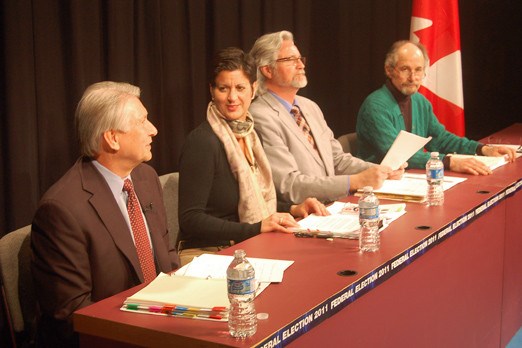It didn’t take long for the F-word to creep into the televised Thunder Bay-Rainy River Debate.
By the second question, NDP incumbent John Rafferty, Conservative candidate Moe Comuzzi-Stehmann, Liberal Ken Boshcoff and the Green Party’s Ed Shields had already begun discussing the merits of FedNor and whether it needed to be a stand-alone agency.
"We do not need any more red tape and we do not need fix something that isn’t broke, that’s all I have to say," Comuzzi-Stehmann said of the $50 million regional economic funding agency.
But incumbent MP Rafferty said Northwestern Ontario needs to be treated like every other region in the country and have its own stand-alone agency, plus a 100 per cent increase in the budget. Southern Ontario, he added, has been creeping into the Northern Ontario fund for years.
"Northern Ontario really has been shortchanged over the last number of decades," Rafferty said. "Where does the North begin?"
Boshcoff agreed, saying a stand-alone agency would bring more money to the region faster with local decision making.
"You don’t really want to wait until it goes through the larger system," he said.
On forestry, Shields said the region needs to start looking at the forest itself as valuable. From value-added products to tourism, Shields said more jobs could be created if the government looked beyond just shipping lumber out of the region.
"We need to change our thinking about exporting whole logs," the Green candidate said.
When Boshcoff was MP in January of 2008, he sat on an all-party natural resources committee that made recommendations that were unanimously agreed upon by Parliament. Since then however, Boshcoff said none of the recommendations have been realized.
"The plans are there, we know exactly what has to be done the government just hasn’t acted," he said.
Raffery said as the NDP’s forestry critic he has been discouraged by the federal and provincial government’s view that forestry is a sunset industry in Northwestern Ontario.
All that needs to happen is for government in Canada to start becoming competitive with the United States in terms of subsidies by either matching them or convincing the U.S. to drop them, Rafferty said.
"That’s all. Let’s just have an even playing field.”
But Comuzzi-Stehmann said it’s up the industry itself to adapt. Much like the North American auto industry, forestry must use innovation and new technology to stay afloat.
"Those that changed (in the auto industry) continued on being prosperous," she said.
All candidates had a different approach for the controversial long-gun registry. Commuzi-Stehman spoke into the camera when she bluntly said what she would do with what she called an ineffective waste.
"Elect me. It will go.”
But Boshcoff said he’s heard from people that since so much money has been spent already. it would be a waste to end it now. It’s also saved countless lives of police officers, he added. The debate really comes down to urban Canada not really understanding the needs of smaller communities.
"We know that it’s a valuable policing tool," Boshcoff said. "Cutting it off now really would be a waste of money."
Raffery said it’s up to an MP to listen to his or her constituents. In his case, Thunder Bay-Rainy River told him to vote to get rid of the registry.
"I think the members of Parliament really need to take very seriously that responsibility," Rafferty said.
Shields said if elected he would use the registry as a bargaining tool with urban MPs to come to a compromise to get it scrapped.
"We should view that as a quid pro quo. You give us something we’ll give you something," Shields said.
Sign in or register
- Messages
- Post a Listing
- Your Listings
- Your Profile
- Your Subscriptions
- Your Likes
- Your Business
- Support Local News
- Payment History
Registered Users
Already have an account?
New Users
Create a free account.
